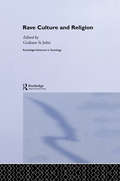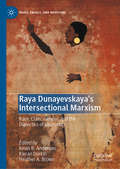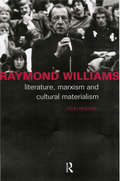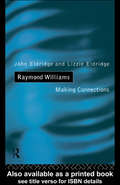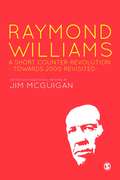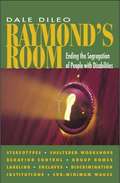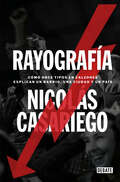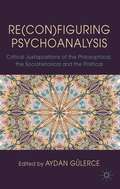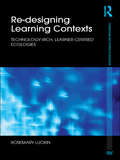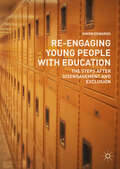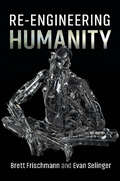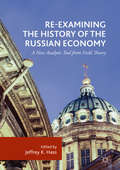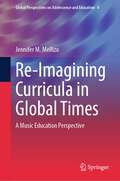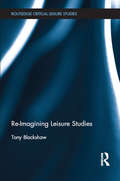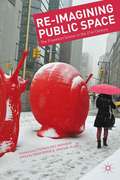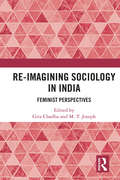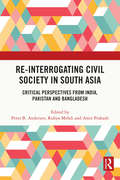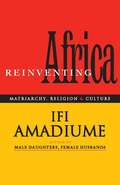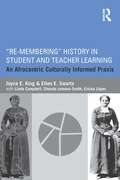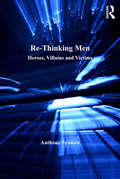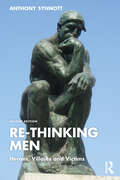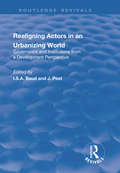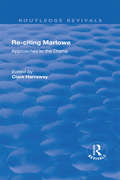- Table View
- List View
Raus aus dem Regiment der Rollenzuschreibungen: Von weiblicher Ohnmacht zu machtvollen Lösungen in Karriere, Partnerschaft und Familie
by Martina LacknerDieses Buch ist kein gewöhnlicher Ratgeber für Frauen. Es spiegelt schonungslos, was die persönliche Weiterentwicklung von Frauen in Partnerschaft, Familie und Beruf ausbremst – mit messerscharfer Analyse verborgener Wechselwirkungen und Traumata. So können Frauen vorhandene Fallen und Hemmnisse, Ängste, Schuldgefühle und weitere tiefsitzende Emotionen erkennen, um sich im Spagat zwischen Partner*in, Kind und Karriere einen Weg aus dem Gefängnis der Rollenzuschreibungen zu bahnen.Frauen sehen sich oft als Opfer des Patriarchats. Doch dass es ihnen an Bewusstsein für die eigene Macht und an Bereitschaft mangelt, sich diese zuzugestehen, dass Frauen die eigene Macht oft weder wahrnehmen noch akzeptieren, ist für die Autorin der Hauptgrund, warum Frauen in tradierten Rollen bleiben, denn Augenhöhe erfordert souveräne Eigenmacht. Dieses Buch lässt erfahrene Führungsfrauen zu Wort kommen, regt zum Nachdenken an und bietet Lösungswege aus scheinbar schwierigen Situationen. Handlungsempfehlungen für entscheidende Weichenstellungen auf dem Weg zur weiblichen Ermächtigung lassen den Leserinnen keine Rückzugsmöglichkeiten in gewohnte und trainierte Gegenargumente. Ein Buch, das sowohl zur Selbstreflektion anregt wie zur öffentlichen Diskussion.Der Inhalt• Das verborgene Mindset: Der Einfluss der Vergangenheit auf weibliche Karrieren• Am Anfang war die Herkunftsfamilie: Familienkonstellationen und ihre Bedeutung • Pubertät: Die Hormone übernehmen die Führung• Der Spagat beginnt: Partnerschaft, Mutterschaft und Karriere• Führung im Widerstreit: Diskrepanz zwischen Wunsch und Wirklichkeit
Rave Culture and Religion (Routledge Advances in Sociology #Vol. 8)
by Graham St JohnThe collection provides insights on developments in post-traditional religiosity (especially 'New Age' and 'Neo-Paganism') through studies of rave's Gnostic narratives of ascensionism and re-enchantment, explorations of the embodied spirituality and millennialist predispositions of dance culture, and investigations of transnational digital-art countercultures manifesting at geographic locations as diverse as Goa, India, and Nevada's Burning Man festival. Contributors examine raving as a new religious or revitalization movement; a powerful locus of sacrifice and transgression; a lived bodily experience; a practice comparable with world entheogenic rituals; and as evidencing a new Orientalism. Rave Culture and Religion will be essential reading for advanced students and academics in the fields of sociology, cultural studies and religious studies.
Raya Dunayevskaya's Intersectional Marxism: Race, Class, Gender, and the Dialectics of Liberation (Marx, Engels, and Marxisms)
by Kevin B. Anderson Kieran Durkin Heather A. BrownRaya Dunayevskaya is one of the twentieth century’s great but underappreciated Marxist and feminist thinkers. Her unique philosophy and practice of Marxist-Humanism—as well as her grasp of Hegelian dialectics and the deep humanism that informs Marx’s thought—has much to teach us today. From her account of state capitalism (part of her socio-economic critique of Stalinism, fascism, and the welfare state), to her writings on Rosa Luxemburg, Black and women’s liberation, and labor, we are offered indispensable resources for navigating the perils of sexism, racism, capitalism, and authoritarianism. This collection of essays, from a diverse group of writers, brings to life Dunayevskaya’s important contributions. Revisiting her rich legacy, the contributors to this volume engage with her resolute Marxist-Humanist focus and her penetrating dialectics of liberation that is connected to Black, labor, and women’s liberation and to struggles over alienation and exploitation the world over. Dunayevskaya’s Marxist-Humanism is recovered for the twenty-first century and turned, as it was with Dunayevskaya herself, to face the multiple alienations and de-humanizations of social life.
Raymond Williams
by Fred InglisIn his life, Raymond Williams played many parts: child of the Black Mountains, inspirational adult lecturer, Cambridge professor, folk hero and guru of the left. After his death, he has remained a symbolic figure and his classic works, Culture and Society, The Long Revolution, The Country and the City continue to inspire new generations all over the world. In this first major biography, Fred Inglis has spoken to those who knew this complex and charismatic man at every stage of his life, from his boyhood in the Welsh border country to his brief years of retirement. Through their voices and his own passionate stories and at times combative engagement with his subject, he tells of a story of a life not just for its time but for our own. After Thatcher and Reagan and the Cold War, Williams still has much to teach us about the nature of a good and just society and about the constant struggle to attain it.
Raymond Williams: Making Connections
by Elizabeth Eldridge John EldridgeThis book provides a critical introduction to the full range of Williams' work - fiction and non-fiction. It assesses the significance of his contribution in understanding culture, politics and society. Fair-minded, accurate and sensitive, the book makes crucial connections between the different aspects of Williams' work and the underlying concern for a democratic polity which informed it.
Raymond Williams: Towards 2000, Revisited
by Jim McGuigan'Culture,' wrote Raymond Williams, ‘is one of the most complicated words in the English language.’ Ironically, the most important British writer on culture in the post-war period is also one of the most poorly digested among today’s readers. Originally conceived as the sequel to his 1961 The Long Revolution, Williams' 1983 title Towards 2000 has been unfairly classified as a period piece. With the permission of the Williams Estate, the book has been re-entitled A Short Counter-Revolution – Towards 2000 Revisited, with noted Williams expert Jim McGuigan adding a chapter that updates the original with a survey of developments since its publication, particularly concerning the impact of neoliberalism, a phenomenon sighted early by Raymond Williams and named ‘Plan X’.
Raymond Williams: Towards 2000, Revisited
by Jim Mcguigan"Raymond Williams: A Short Counter-Revolution amply demonstrates the continuing relevance of Williams's analysis, from the early 1980s, to our current situation. After thirty years of neoliberalism his insights still read as freshly and as incisively as they first did. Jim McGuigan's new chapter explicitly extends the lines of continuity from then to now, in a persuasive and at times appropriately critical way. Williams's concluding chapter, Resources for a Journey of Hope remains as inspiring, and as necessary, as ever." - Simon Dentith, University of Reading "It's great that Towards 2000 is revisited. Jim McGuigan's preface to this edition and his remarkable up-dating chapter A Short Counter Revolution draw upon a formidable range of references to illustrate why this work is as fresh and insightful today as it was 30 years ago." - Derek Tatton, www.raymondwilliamsfoundation.org.uk 'Culture,' wrote Raymond Williams, 'is one of the most complicated words in the English language.' Ironically, the most important British writer on culture in the post-war period is also one of the most poorly digested among today's readers. Originally conceived as the sequel to his 1961 The Long Revolution, Williams' 1983 title Towards 2000 has been unfairly classified as a period piece. With the permission of the Williams Estate, the book has been re-entitled A Short Counter-Revolution - Towards 2000 Revisited, with noted Williams expert Jim McGuigan adding a chapter that updates the original with a survey of developments since its publication, particularly concerning the impact of neoliberalism, a phenomenon sighted early by Raymond Williams and named 'Plan X'. In this new edition, Jim McGuigan makes a totally convincing case to read the book as a contemporary classic. It remains an indispensable guide to: Power and inequality Class politics Post-industrial society Globalization The crisis in democracy
Raymond's Room: Ending the Segregation of People with Disabilities
by Dale DileoThe horror of the past collides with the dismal reality of present day thinking in Dale DiLeo's engaging memoir about his coming of age in the disability profession. DiLeo invites us into his life and mind, as well as into the one-room prison that represents the systemic exclusion and isolation perpetuated by the present matrix of services for people with severe disabilities. Raymond's Room provides poignant real-life vignettes that examine how the disabilities services system can unintentionally exacerbate a person's existing life challenges.
Rayografía: Cómo once tipos en calzones explican un barrio, una ciudad y un país
by Nicolás CasariegoEn vísperas del centenario del Rayo Vallecano, Casariego juega el partido de una trepidante y personal crónica de esta temporada del club obrero por excelencia.El 20 de agosto de 2022, en un Madrid azotado por una ola de calor, el escritor y guionista Nicolás Casariego se subió al metro en dirección a Vallecas con el objetivo de abonarse al Rayo Vallecano, un club a las puertas de celebrar su centenario. Ignoraba que le esperaba una noche al raso y una aventura de diez meses. Esta es la historia de un aficionado que trata de entender de qué va hoy el fútbol siguiendo los pasos del equipo de un barrio singular.A lo largo de la temporada 2022-2023, asistió a todos los partidos del Rayo en su estadio, a los que disputó como visitante contra sus vecinos madrileños y a nueve de los que jugó en otras ciudades, viajando a todas las Comunidades españolas con clubes en Primera División. Recorrió más de 4.500 kilómetros y trató con cientos de personajes. Sobre todo, se preguntó si un adulto puede cambiar su identidad y hacerse de otro equipo. Cargado de humor, este libro va más allá del fútbol. Incluye un autorretrato y reflexiones sobre aspectos tan variados como el análisis financiero de las cuentas de un club, el crecimiento urbanístico de una ciudad o la explicación científica de lo que nos ocurre en el cerebro al celebrar un gol. A medio camino entre las memorias y la crónica de una pasión, Rayografía describe desde las gradas un universocontrovertido, un negocio multimillonario y sin fronteras y un territorio dominado por la emoción. En definitiva, la vida.
Re(con)figuring Psychoanalysis: Critical Juxtapositions of the Philosophical, the Sociohistorical and the Political
by Aydan GülerceLeading international scholars present novel dialogues between different psychoanalytic orientations as well as between the particularities of diverse socio-cultural and historical contexts in order to offer critical insights which are highly relevant to the current intellectual debates and social praxis.
Re-Designing Learning Contexts: Technology-Rich, Learner-Centred Ecologies (Foundations and Futures of Education)
by Rosemary LuckinWhat do we mean by the word ‘context’ in education and how does our context influence the way that we learn? What role can technology play in enhancing learning and what is the future of technology within learning? Re-Designing Learning Contexts seeks to re-dress the lack of attention that has traditionally been paid to a learner’s wider context and proposes a model to help educators and technologists develop more productive learning contexts. It defines context as the interactions between the learner and a set of inter-related resource elements that are not tied to a physical or virtual location. Context is something that belongs to an individual and that is created through their interactions in the world. Based on original, empirical research, the book considers the intersection between learning, context and technology, and explores: the meaning of the concept of context and it’s relationship to learning the ways in which different types of technology can scaffold learning in context the Learner-Centric ‘Ecology of Resources’ model of context as a framework for designing technology-rich learning environments the importance of matching available resources to each learner’s particular needs the ways in which the learner’s environment and the technologies available might change over the coming years the potential impact of recent technological developments within computer science and artificial intelligence. This interdisciplinary study draws on a range of disciplines, including geography, anthropology, psychology, education and computing, to investigate the dynamics and potential of teacher-learner interaction within a learning continuum, and across a variety of locations. It will be of interest to those teaching, researching and thinking about the use of technology in learning and pedagogy, as well as those involved in developing technology for education and those who use it in their own teaching. For practical examples of the way the Ecology of Resources framework has been used visit: http://eorframework.pbworks.com.
Re-Engaging Young People with Education: The Steps after Disengagement and Exclusion
by Simon EdwardsThis book examines how young people can be re-engaged with schooling and their own learning beyond the school gates. Despite attempts by successive UK governments to promote engagement with education, there has been a substantial increase in formal and informal exclusions from secondary schools, particularly of underperforming students who come from low income families. The book builds on an ethnographic study carried out in a youth centre based on a secondary school site, exploring the social and cultural worlds of fourteen students as they complete a GCSE teamwork assessment. Analysing the ‘translation’ process of the students as they relocate their understanding of teamwork into the language of assessment, the author posits that student identity is a holistic individual project, where knowledge is produced within the conditions for the production of the self-narrative. This volume calls to educators to recognise the importance of relational pedagogy rooted in social practices, rather than individual cognitive performance. It is sure to be of value and interest to students and scholars of exclusion in education and relational pedagogy, as well as practitioners and policy makers.
Re-Engineering Humanity
by Evan Selinger Brett FrischmannEvery day, new warnings emerge about artificial intelligence rebelling against us. All the while, a more immediate dilemma flies under the radar. Have forces been unleashed that are thrusting humanity down an ill-advised path, one that's increasingly making us behave like simple machines? <P><P>In this wide-reaching, interdisciplinary book, Brett Frischmann and Evan Selinger examine what's happening to our lives as society embraces big data, predictive analytics, and smart environments. They explain how the goal of designing programmable worlds goes hand in hand with engineering predictable and programmable people. <P>Detailing new frameworks, provocative case studies, and mind-blowing thought experiments, Frischmann and Selinger reveal hidden connections between fitness trackers, electronic contracts, social media platforms, robotic companions, fake news, autonomous cars, and more. <P>This powerful analysis should be read by anyone interested in understanding exactly how technology threatens the future of our society, and what we can do now to build something better.<P> Offers an academically rigorous and interdisciplinary analysis.<P> Written in accessible prose with resonant examples.<P> Includes mind-blowing thought experiments.
Re-Examining the History of the Russian Economy: A New Analytic Tool from Field Theory
by Jeffrey K. HassThis book explores the application of field theory (patterns of interaction) to Russian economic history, and how social and political fields mediate the influences of institutions, structures, discourses and ideologies in the creation and dissemination of economic thinking, theory and practice. Using focused cases on Russia's economy from the mid-nineteenth century to the present, Hass and co-authors expand the empirical basis of field studies to provide new material on Russian economic history. The cases are divided into two complementary halves: i) The role of fields of institutions, discourses, and structures in the development of Russian economic thought, especially economic theories and discourses; and ii) The role of fields in the real adoption and implementation of policies in Soviet and Russian economic history. With developed discussion of fields and field theory, this book moves beyond sociology to demonstrate to other disciplines the relation of fields and field theory to other frameworks and methodological considerations for field analysis, as well as providing new empirical insights and narratives not as well-known abroad.
Re-Imagining Curricula in Global Times: A Music Education Perspective (Global Perspectives on Adolescence and Education #4)
by Jennifer M. MellizoThrough this book, the author examines the role of music education within the larger global education movement. Specifically, the author argues music education has unique potential to foster positive global identity and to promote higher levels of intercultural sensitivity during adolescence. Music educators can use the framework in this book to craft lessons that will help their adolescent students develop positive global identities as they progress towards higher levels of intercultural sensitivity within the context of musical learning experiences. The book also offers a framework that can help practicing and pre-service music educators to engage in the type of cultural and musical self-reflection needed to resist deeply engrained hegemonic tendencies. As such, more students have access to an inclusive, flexible, and meaningful musical education. Within the final two chapters, the author proposes - and provides concrete examples of - a new curricular planning strategy for music educators which synthesizes the information presented in the preceding chapters and provides a concrete vision for (re)imagining music education as global education.
Re-Imagining Leisure Studies (Routledge Critical Leisure Studies)
by Tony BlackshawIn this provocative new book, Tony Blackshaw argues that Leisure Studies is in a quiet but deep state of crisis. The twenty-first century has brought profound change to all aspects of society, including a plurality of new leisure worlds, and traditional concepts of Leisure Studies fail to capture this richness. This book aims to re-invigorate Leisure Studies by revealing and unpacking these leisure worlds, thereby changing the way we think about leisure and the way we do Leisure Studies. Both trivial and serious in its implications, it is precisely this paradox that makes leisure such a fascinating subject of study. Re-Imagining Leisure Studies presents a new and radical set of methodological rules for studying leisure trends and cultures in contemporary society. It discusses the critical issues that underpin recent developments in leisure theory and explores the key themes of social class, community, politics, freedom and globalization. Marking a turning point in the reception and understanding of Leisure Studies, this book is vital reading for all students and scholars with a social scientific interest in leisure.
Re-Imagining Public Space
by Diana Boros James M. GlassWith a foreword by Stephen Bronner, this volume edited by Diana Boros and James Glass consists of reflections from contemporary political and social theorists on the concept of public space and what it means in the context of modern political life. The contributors lay the foundation for thinking about public space, moving beyond historical analyses of Frankfurt School theorists to offer a new perspective on how to think about public space, how to theorize its implications, and how to construct a theory of democratic political life through political action that takes seriously how politics workwithin the public space. The contributors, including Douglas Kellner, David Ingram, Lauren Langman, Lars Rensmann, Michael Thompson, Michael Diamond, C. Fred Alford, Mary Caputi, and Malcolm Miles, come from a variety of scholarly backgrounds but all are in agreement that a democratic politics will not be viable in protecting rights, tolerance, and freedom unless it is grounded in a theory that embraces participation in public life, as well as art and protest as democratic action in the public space
Re-Imagining Sociology in India: Feminist Perspectives
by Gita Chadha M. T. JosephThis book maps the intersections between sociology and feminism in the Indian context. It retrieves the lives and work of women pioneers of and in sociology, asking crucial questions of their feminisms and their sociologies. The chapters address the experiential realities of women in the field, pedagogical issues, methodological frameworks, mentoring processes and artistic engagements with academic work. The volume’s strength lies in bringing together Indian scholars from diverse social backgrounds and regions, reflecting on the specificity of the Indian social sciences. The chapters cover a range of key areas, including sexuality, law, environment, science and medicine. This volume will greatly interest students, teachers, researchers and practitioners of sociology, women’s studies, gender studies and feminism, politics and postcolonial studies.
Re-Interrogating Civil Society in South Asia: Critical Perspectives from India, Pakistan and Bangladesh
by Amit Prakash Rubya Mehdi Peter B. AndersenThis book offers an overview of the history and development of civil society in three major nations of South Asia – Pakistan, India and Bangladesh – from colonial times to the present. It examines the liberalization of civil society since the 1980s, the needs it created for civil action, the professionalization of civil society organizations, and the extent to which civil society may benefit society at large in the context of local, national and global transformations in the economy, political regime and ideology. The reader will find new insights on the interaction between the liberalization of multifaceted civil societies in the three countries, presenting contrasts such as restrictions put on women’s organizations or labour unions and acceptance of religious organizations’ activities. The volume looks at forms of transfer of civil society models, representation and democratic legitimacy of civil society organizations such as nongovernmental organizations, government organized NGOs and faith-based organizations, along with the structuring of civil society through legal frames as well as female, religious, and ethnic mobilizations around language and literature. Using wide-ranging empirical data and theoretical analyses, it deals with civil society issues relating to human rights and political challenges, justice, inequality, empowerment, and the role of bureaucracy, women’s movements, and ethnic and linguistic minorities. It also presents early responses to the Covid-19 crisis in 2020 which created significant pressure on the states and on civil society. This book will be useful to scholars and researchers of political studies, development studies, sociology, public policy and governance, law and human rights, as also to professionals in think tanks, civil society activists and NGOs.
Re-Inventing Africa: Matriarchy, Religion and Culture
by Ifi AmadiumeThis extraordinary book issues a clarion call for a new understanding of Africa. The author of the best-selling Male Daughters/Female Husbands here issues a challenge to western anthropologists to recognize their own complicity in producing a version of Africa that is often little more than a reflection of their own class-based, patriarchal thought. <P><P>Professor Amadiume calls instead for a new history of Africa, made and written by Africans. This is such a book.
Re-Membering History in Student and Teacher Learning: An Afrocentric Culturally Informed Praxis
by Joyce E. King Ellen E. SwartzWhat kind of social studies knowledge can stimulate a critical and ethical dialog with the past and present? "Re-Membering" History in Student and Teacher Learning answers this question by explaining and illustrating a process of historical recovery that merges Afrocentric theory and principles of culturally informed curricular practice to reconnect multiple knowledge bases and experiences. In the case studies presented, K-12 practitioners, teacher educators, preservice teachers, and parents use this praxis to produce and then study the use of democratized student texts; they step outside of reproducing standard school experiences to engage in conscious inquiry about their shared present as a continuance of a shared past. This volume exemplifies not only why instructional materials—including most so-called multicultural materials—obstruct democratized knowledge, but also takes the next step to construct and then study how "re-membered" student texts can be used. Case study findings reveal improved student outcomes, enhanced relationships between teachers and families and teachers and students, and a closer connection for children and adults to their heritage.
Re-Thinking Men: Heroes, Villains and Victims
by Anthony SynnottMuch writing on men in the field of gender studies tends to focus unduly, almost exclusively, on portraying men as villains and women as victims in a moral bi-polar paradigm. Re-Thinking Men reverses the proclivity which ignores not only the positive contributions of men to society, but also the male victims of life including the homeless, the incarcerated, the victims of homicide, suicide, accidents, war and the draft, and sexism, as well as those affected by the failures of the health, education, political and justice systems. Proceeding from a radically different perspective in seeking a more positive, balanced and inclusive view of men (and women), this book presents three contrasting paradigms of men as Heroes, Villains and Victims. With the development of a comparative and revised gender perspective drawing on US, Canadian and UK sources, this book will be of interest to scholars across a range of social sciences.
Re-Thinking Men: Heroes, Villains and Victims (Routledge Research in Gender and Society)
by Anthony SynnottMuch writing on men in the field of gender studies tends to focus unduly, almost exclusively, on portraying men as villains and women as victims in a moral bi-polar paradigm. Re-Thinking Men reverses the proclivity which ignores not only the positive contributions of men to society, but also the male victims of life including the homeless, the incarcerated, the victims of homicide, suicide, accidents, war and the draft, and sexism, as well as those affected by the failures of the health, education, political, and justice systems. Proceeding from a radically different perspective in seeking a more positive, balanced, and inclusive view of men (and women), this book presents three contrasting paradigms of men as heroes, villains, and victims. Revised and updated, and presenting data and studies from the United States, Canada, and the United Kingdom, it offers a comparative and revised perspective on gender that will be of interest to scholars across a range of social sciences.
Re-aligning Actors in an Urbanized World: Governance and Institutions from a Development Perspective (Routledge Revivals)
by I. Baud J. PostThis title was first published in 2003. In the 1980s, discussions on urban, regional and international development were dominated by those advocating liberalism and free markets. In the 1990s, the experiences of many countries from the previous Soviet Union and those following socialist development models in the South have led to a renewed interest in the democratic institutions that underpin economic development processes. Thus, the state has come back into focus as an "enabler", a co-ordinating agency working with a variety of other organizations in different forms of partnership aimed at urban and regional development. At the same time, increasing disparities between rich and poor have led poor urban households to organize collectively against poverty and to promote community and neighbourhood development. This title examines how both these processes take place, looking at patterns of fundamental re-aligning between state, civil society and the market in an integrated manner. It focuses on urban and regional development, because at the local and regional levels the direct interface between local government, the local and global market, and civil society organizations occurs. The question of re-alignment is considered from three main perspectives: governance and community organization issues at local level, urban areas as motors of economic development and their interface with globalization processes, and urban areas as the nodes of regional development. In each part of the book, one of these perspectives is taken. The contributions of the different authors are grouped around these complementary perspectives. Changing alignment patterns also have far-reaching implications. In the last section, the relation between research and policy around these issues is considered, based on reflections by policy makers and academics who have been influential both nationally and internationally.
Re-citing Marlowe: Approaches to the Drama (Routledge Revivals)
by Clare HarrawayThis title was first published in 2000: Re-citing the available information on Christopher Marlowe, this study seeks to illuminate the preoccupations and pitfalls of previous accounts of the dramatist's canon in an effort to discover, or to elaborate, new areas of investigation. Each chapter considers one of Marlowe's dramatic works in relation to a different critical approach or isue suggested by scholarship's prior treatment of the play. The book consequently operates on two levels: it is a review of a canon which has suffered theoretical neglect; and a blueprint for a more critically sophisticated approach to English literature.

